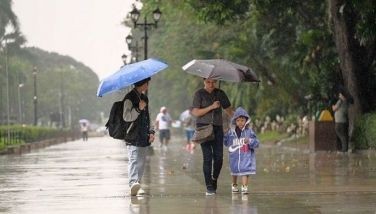Former ‘comfort women’ urged to accept indemnity

February 20, 2005 | 12:00am
TOKYO, Japan — After years of living in shame, some 90 elderly Filipinas who were used as "comfort women" during World War II are now living comfortable lives as millionaires.
Ambassador to Japan Domingo Siazon Jr. said yesterday he only wishes that other former comfort women in the Philippines will follow their lead instead of pressing on with a class suit against the Japanese government which has already been turned down by Tokyo courts.
Siazon told visiting Filipino journalists who paid him a courtesy call at the Philippine embassy here that as many as 90 former comfort women were each indemnified the amount of two million yen or P1 million through private funds set up in Japan.
"So there are now 90 new Filipina millionaires in our country and I am glad they can at least use this money to lead comfortable lives during their remaining twilight years," he said.
Siazon said these 90 former comfort women – forced to serve as sex slaves by Japanese forces during World War II – also received an individually addressed formal written apology by two former prime ministers of Japan when they were given the compensation package.
"This is not about money but the honor and dignity restored to our own victims – comfort women – during World War II," he said.
The fight of former comfort women to seek financial compensation as well as an apology from the Japanese government for their ordeal was first led by Lola Rosa Henson, a former comfort woman who died at age 69 in 1997.
Siazon meanwhile deplored that a larger number of former comfort women have not received any apology or indemnification. He said they belong to a group being assisted by militant Filipino women’s organizations pushing for a class-action suit. One of their demands is that the money for their indemnification should come from the Japanese government, not a private fund.
"But why press for such a thing when no less than two prime ministers of Japan have already officially and formally apologized to each one of them, aside from the repeated public apologies that the Japanese government has been making through these years?" he said.
Siazon said Henson herself once came to his office at the embassy, accompanied by a group of Filipino women activists, and expressed her desire for an early resolution to their claims for indemnification.
"I was glad she herself decided on her own not to be influenced any more by any group, however well-meaning they may be," he said.
As far as he knows, Siazon said, the Japanese government is processing some 200 out of 500 claims for indemnification filed by former comfort women from the Philippines.
He said the Japanese government is looking closely into any "doubtful" claims.
Ambassador to Japan Domingo Siazon Jr. said yesterday he only wishes that other former comfort women in the Philippines will follow their lead instead of pressing on with a class suit against the Japanese government which has already been turned down by Tokyo courts.
Siazon told visiting Filipino journalists who paid him a courtesy call at the Philippine embassy here that as many as 90 former comfort women were each indemnified the amount of two million yen or P1 million through private funds set up in Japan.
"So there are now 90 new Filipina millionaires in our country and I am glad they can at least use this money to lead comfortable lives during their remaining twilight years," he said.
Siazon said these 90 former comfort women – forced to serve as sex slaves by Japanese forces during World War II – also received an individually addressed formal written apology by two former prime ministers of Japan when they were given the compensation package.
"This is not about money but the honor and dignity restored to our own victims – comfort women – during World War II," he said.
The fight of former comfort women to seek financial compensation as well as an apology from the Japanese government for their ordeal was first led by Lola Rosa Henson, a former comfort woman who died at age 69 in 1997.
Siazon meanwhile deplored that a larger number of former comfort women have not received any apology or indemnification. He said they belong to a group being assisted by militant Filipino women’s organizations pushing for a class-action suit. One of their demands is that the money for their indemnification should come from the Japanese government, not a private fund.
"But why press for such a thing when no less than two prime ministers of Japan have already officially and formally apologized to each one of them, aside from the repeated public apologies that the Japanese government has been making through these years?" he said.
Siazon said Henson herself once came to his office at the embassy, accompanied by a group of Filipino women activists, and expressed her desire for an early resolution to their claims for indemnification.
"I was glad she herself decided on her own not to be influenced any more by any group, however well-meaning they may be," he said.
As far as he knows, Siazon said, the Japanese government is processing some 200 out of 500 claims for indemnification filed by former comfort women from the Philippines.
He said the Japanese government is looking closely into any "doubtful" claims.
BrandSpace Articles
<
>
- Latest
- Trending
Trending
Latest
Trending
Latest
Recommended































